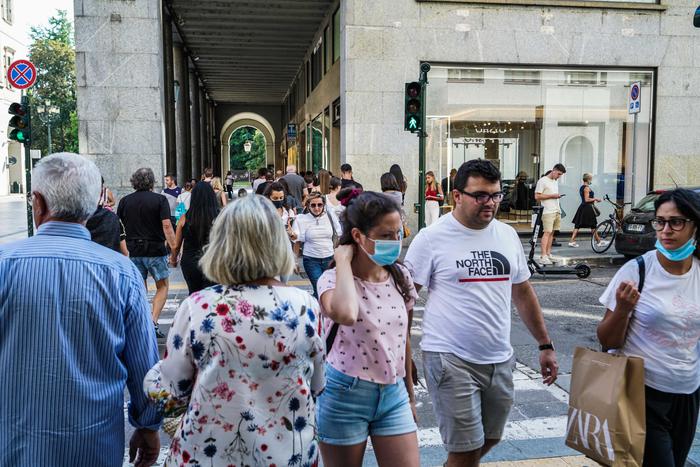
[ad_1]
Coronavirus infections in Italy continue to increase: in the last 24 hours, according to data from the Ministry of Health, 1,616 new cases have been registered, while yesterday they were 1,597. The total number of infected people, including victims and those cured, is 284,796. On the other hand, the increase in the number of deaths is stable: 10 in a day, like Thursday, for a total of 35,597 victims since the start of the pandemic. Those healed and discharged are a total of 212,432, 547 more than yesterday. No region presents zero new cases, while the highest increases are registered in Lombardy (+257), Veneto (+173), Emilia Romagna (+152). More than a hundred new cases also Lazio, Tuscany and Sicily. The growth of patients hospitalized for Covid 19 in intensive care continues: to date, according to data from the Ministry of Health, there are 175, eleven more than on Thursday. The number of people currently positive is also growing – 1,059 in a single day, for a total of 36,767 – of those hospitalized in other hospital wards (a total of 1,849, 13 more than yesterday) and of people in home isolation (1,035 more than yesterday for a total of 34,743). Nearly 99,000 swabs have been done in the last 24 hours, about 4,700 more than yesterday.
Reducing the quarantine period from 14 to 10 days “would result in a loss of detection of symptomatic cases among close contacts of confirmed cases of around 6%.” This is what the European Center for Disease Prevention and Control (ECDC) states in a document, held by ANSA, in response to a specific request from Germany. The 6% percentage, adds the ECDC, is “large enough to be of relevance to public health in a setting where the level of exposure is high (such as close contact quarantine).”
On August 27, Germany posed a specific question, asking whether the clear scientific evidence supported a reduction of the quarantine from 14 to 10 days. The ECDC experts’ response came 5 days later, on September 1. “Based on the evidence described below, the document reads, ECDC believes there is insufficient evidence to support a decrease in the incubation period of Covid 19 from 14 to 10 days. ECDC continues to monitor and review evidence as soon as it is available to ensure timely updates on its assessments. ” In the current state of knowledge, says the European Center, a reduction in these terms would precisely determine a loss in case detection quantified of around 6%. The expert assessment, the document continues, is based on five different studies examining the incubation time interval for Covid 19 after exposure to infection.
The length of quarantine times in the case of a suspected coronavirus divides and generates discussion. Although in fact the France confirms reduction of days to 7 and the health ministers of the EU examine the “file”, 150 scientists ask for its reduction. But one word mostly comes from the WHO, which recommends keeping it in 14 days. Following the line of greater rigor is also Italy that, with the Scientific Technical Committee, has so far favored the precautionary line with a 14-day quarantine and a double negative mattress. WHO “is following the discussions” but “defends the recommendation of a 14-day quarantine to prevent the transmission of the virus.” “This recommendation – adds the Organization – is based on the data available on the incubation period; in essence, the average period is 4-5 days, with an upper limit of 14 days ”. “Some countries – continues WHO Europe – are evaluating a reduction of the quarantine period combined with a trial activity, taking into account both scientific evidence and social factors.
“At the moment no decision has been made. We will discuss it in the technical-scientific committee, we will also discuss it with other European countries based on this orientation, we will make our final choice. Consider that at this time the WHO indication is and continues to be 14 days ”. This was stated by the Minister of Health, Roberto Speranza., responding on the sidelines of a meeting in Bari to a question from journalists about the hypothesis of reducing the duration of the quarantine. “These are evaluations that our scientists do,” said the minister.